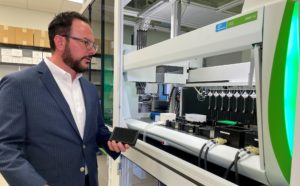May is National Cancer Research Month, launched in 2007 by the American Association for Cancer Research to highlight the importance of lifesaving cancer research. For more than 40 years, the Flint Animal Cancer Center has been at the forefront of comparative oncology research and discovery to benefit pets and people with cancer.
In line with our vision to conquer cancer in all species, we have 13 established research programs focused on several aspects of cancer, including molecular oncology, immunology, radiation biology, and cancer biology and experimental therapeutics. At the heart of our work is our motivation to improve the lives of pets and people with cancer, and one day, hopefully, find a cure.
As the keynote speaker at a presentation late last year, National Cancer Institute director Dr. Ned Sharpless declared we have entered the golden age of cancer research. We’re seeing rapid progress in treating and curing some cancers in people. Our team is motivated by possibility and working together to use each other’s expertise and employ advanced technologies to accelerate discovery.
Collaborating to Conquer Cancer in Pets and People
At the FACC, research is a team effort. “Team science or collaborative science is really the most effective way to work,” said Dr. Dan Gustafson, FACC director of research.
Gustafson’s Pharmacology Lab plays large and small roles with research partners across the FACC to help cancer drug development and efficacy studies.
Dr. Sue Lana, director of the FACC Biorepository, also works closely to support researchers across the cancer center.
“Our role is as a bridge between a patient who comes in, who gets diagnosed with cancer, and then we typically work with a basic scientist who studies some aspect of that tumor,” said Lana.
Dr. Dawn Duval, who leads the FACC Molecular Oncology Lab, is one of those basic scientists.
“Using patient tumor samples, she studies how cancer cells work in the tumor, which can lead to discoveries that might help us understand how to better diagnose or treat our patients.”
In her Molecular Oncology Lab, Duval examines the RNA and DNA of tumor samples to identify mistakes that allow cancer cells to grow.
“By identifying the key errors, we can potentially develop new therapies that target those specific mistakes to treat patients,” said Duval. “The hope is that because the treatments are very focused, they can have fewer side effects and be more effective than traditional cancer treatments.”
Drs. Keara Boss and Steve Dow are partnering to explore the relationship between radiation therapy and immunotherapy. Through basic laboratory study and a clinical trial, their teams are working together to evaluate the immune response following radiation therapy when combined with immunotherapy drugs in canine patients with nasal tumors.
“With radiation therapy, we’re excellent at killing tumor cells, but unfortunately, it’s not a cure for certain tumor types,” said Boss.
According to Boss, there’s evidence that incorporating immunotherapy with radiation therapy can boost the anti-tumor response and, hopefully, improve patient outcomes.
The drug combination is based on Dow’s earlier work with bone cancer. “It makes sense that radiation triggers an immune response,” said Dow. “If we could amplify that response with the immunotherapy we’ve developed for bone cancer, could it give us better results for patients with nasal cancer, which is an unsolved problem in dogs?”
Boss is hopeful that this work will benefit dogs and translate to people one day. “We treat many dogs for nasal cancer each year, but sinonasal cancer in people is rare. If we find positive outcomes in dogs, translating that to people is the goal. I’m optimistic that we will learn something really interesting in the next few years.”
CSU + CU: Disrupting the Status Quo in Comparative Oncology Research
The FACC has worked closely with the University of Colorado Cancer Center for more than two decades. Together, we are partners in the world’s most advanced comparative oncology research program. Our work revolutionizes cancer research by building

bridges between animal and human cancer. Through many collaborative projects, our scientists and clinicians work with their teams to develop new treatment strategies that can be rapidly and safely studied in pet dogs to inform studies in people. While a clinical trial may take 5-10 years in humans, it may only take 1-2 years in dogs, which means less time before researchers know if a treatment works.
“The Flint Animal Cancer Center and the CU cancer center have been partners for 20 years,” said Dr. Rod Page, director of the FACC. “We’ve had a number of different projects that really demonstrate that strength of our partnership. We are, in many ways, Colorado’s cancer center, not just the University of Colorado or Colorado State University.”
Thanks to our partnership, we are recently accessing new technologies, including CRISPR-Cas9 gene editing and high throughput drug screening processes that allow us to zero in on the DNA triggering tumor growth and rapidly test targeted drug therapies. We’re excited about the possibility of personalizing our treatment approaches to improve outcomes for pets with cancer and speed up advances for people.
______________________________________________
Aside from grant funding, gifts from friends of the FACC are critical to support our basic research programs. Private philanthropy provides flexible funding to support our greatest needs, from additional graduate students to laboratory equipment to the ability to fund promising pilot research projects. Your investment in our research program will accelerate progress in our quest to conquer cancer. Please donate today.